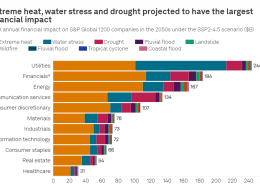Global demand for voluntary carbon credits is projected to increase significantly, potentially growing by 15 times by 2030 and by 100 times by 2050.
According to a publication in the Financial times in partnership with law firm White & Case, once viewed as a way for companies to bypass genuine emissions reduction, purchasing carbon credits is now under greater scrutiny, making them increasingly important in achieving net-zero goals, especially for companies unable to meet targets through emissions reductions alone. Additionally, funds from these credits help support the global transition to clean energy by financing projects that reduce or remove emissions.
Voluntary carbon credit markets function by treating carbon dioxide and other greenhouse gases as tradeable commodities, allowing organisations to offset emissions globally by purchasing credits from anywhere in the world. Methods for reducing carbon dioxide include nature-based solutions like reforestation, advanced technologies like direct air capture, and carbon capture and storage (CCS) or utilization (CCUS). While CCS focuses on permanently storing carbon, CCUS involves reusing it in industrial processes.
Some CCUS methodologies allow a company to generate credits if, after removing and storing the carbon, it uses it in a subsequent project that converts it into plastic, concrete or biofuels. “But that’s a small piece of the market. Most of the projects we see are long-term storage of the carbon,” said Seth Kerschner, a partner in law firm White & Case’s New York office.
Voluntary carbon markets have seen a significant transformation in recent years. Previously, there was widespread skepticism about the effectiveness of some credits in truly reducing emissions, but concerns about greenwashing have diminished. This change is partly due to advancements in digital technologies like satellite imaging and remote sensing, which offer real-time verification of carbon dioxide sequestration. Additionally, the emergence of clear standards set by organisations like the Integrity Council for Voluntary Carbon Markets has helped identify high-quality credits. The market itself is also pushing for higher standards, with large-scale buyers demanding more reliable credits and sellers prioritising those with credible carbon reduction strategies.
“It’s moving the market in the right direction,” said Ingrid York, a White & Case partner who practices in the firm’s Capital Markets group in London. CCS credits, she explains trade significantly higher because their permanence (meaning that the carbon removed is securely stored for several centuries) is certain. “We’re seeing the price begin to reflect the quality.”
Companies are facing increasing pressure to engage with voluntary carbon markets more responsibly. The UN-backed Science-Based Targets Initiative (SBTi) mandates that credits cannot be counted toward SBTi goals, which focus on measurable reductions within a company’s operations and supply chain. Similarly, the Voluntary Carbon Markets Integrity Initiative provides guidelines for using credits to substantiate emissions reduction claims.
The threat of future fines or rising costs for carbon credits incentivises companies to reduce operational emissions now, as delaying could lead to higher expenses later. New regulations requiring disclosure of offset purchases further encourage companies to prioritize genuine emissions reductions over reliance on credits, making carbon credits a component of a broader decarbonization strategy, only to be used after exhausting operational emissions-reduction efforts.
Disclosure requirements will also play a role in companies reducing their operational emissions. “New regulations require companies to disclose their offset purchases, making their approach with respect to offsetting versus emissions reduction much more public. This could lead to additional reputational risk for disclosing companies and demands for increased emissions reduction efforts,” said Taylor Pullins, a partner in the Global Environmental Practice in White & Case’s Houston office.
“The carbon markets are here to stay. They’re more sophisticated, with higher-quality products, and are clearly among the suitable tools in the decarbonisation toolkit,” said Ingrid York.





















